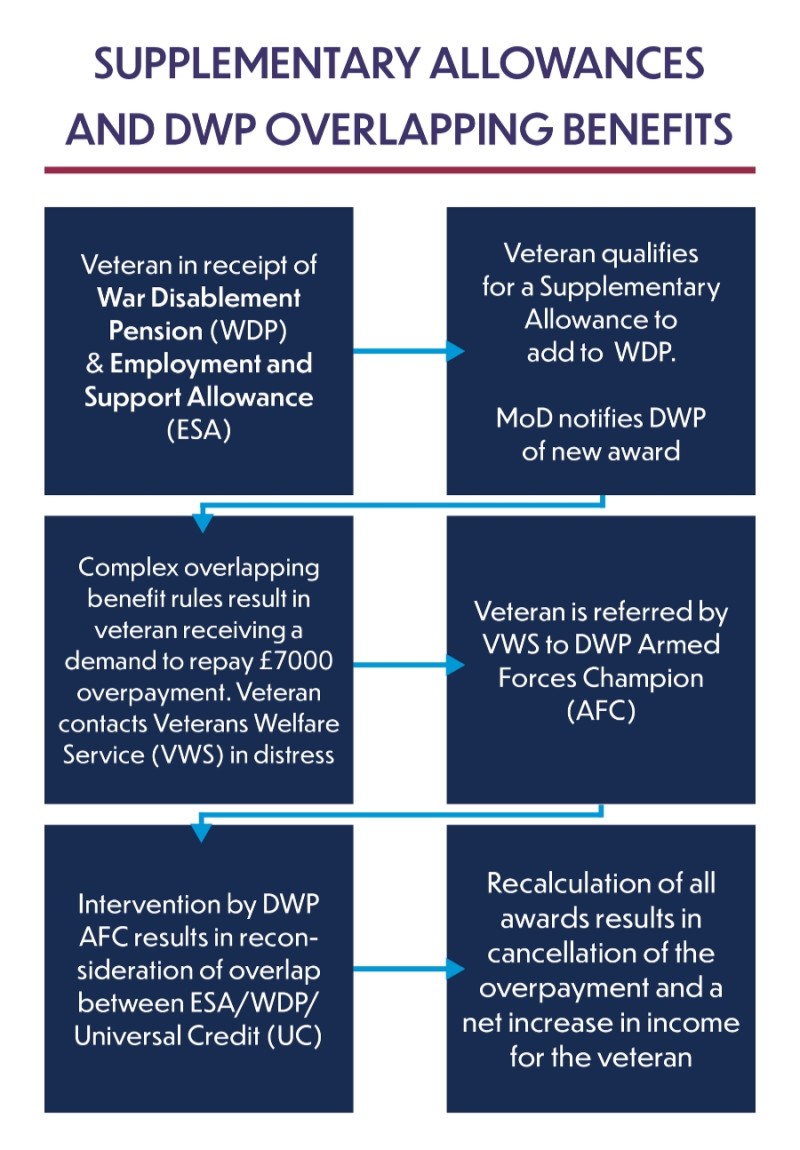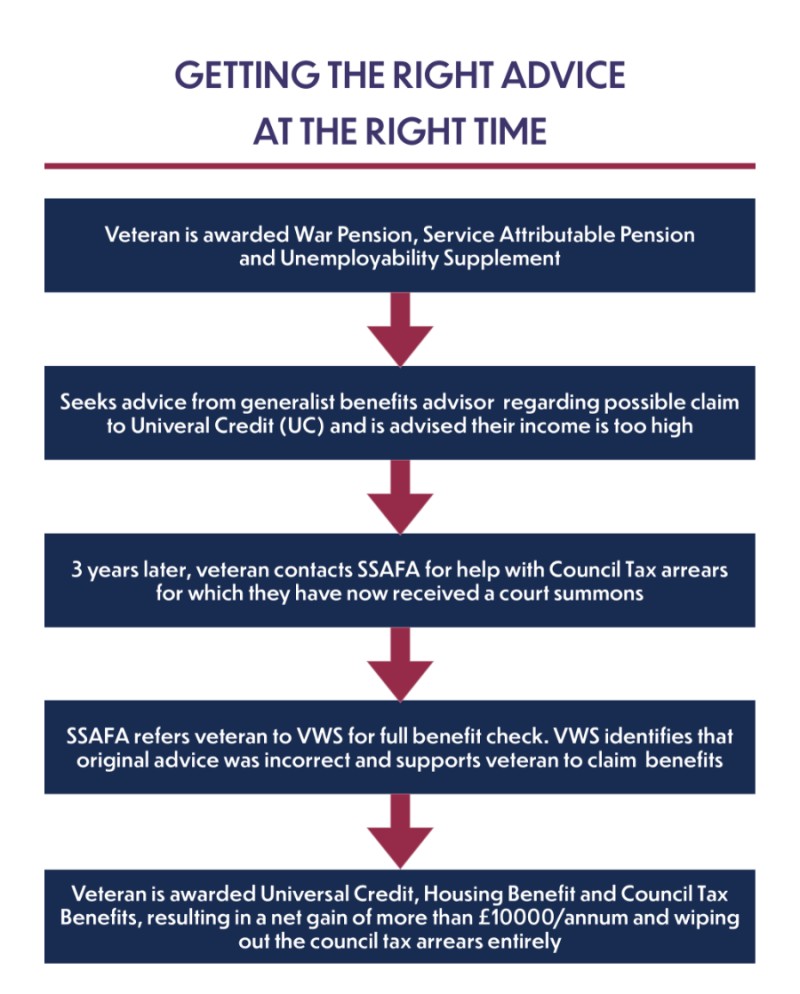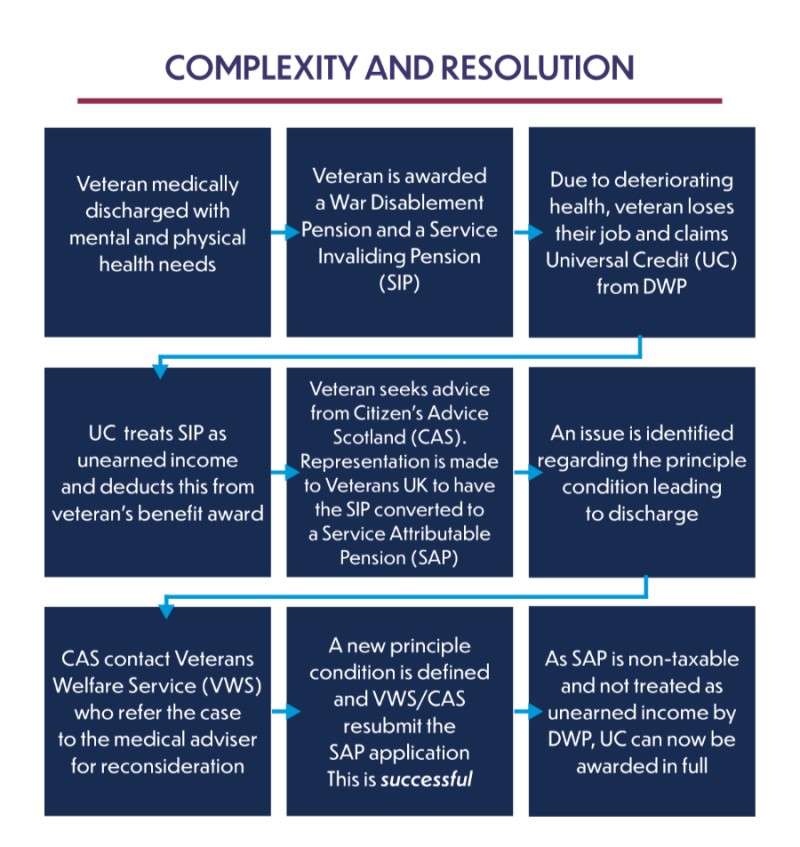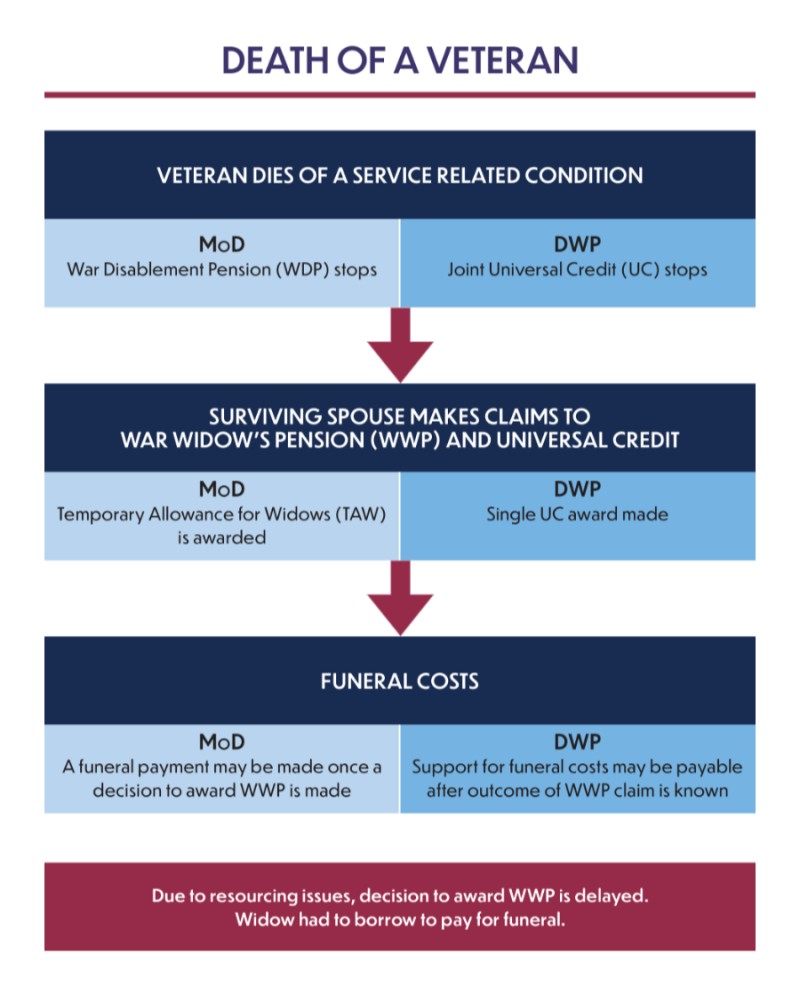Section 2 – Veterans and Finance: Benefits and the Welfare System
Policy, Research and Operational Context
The welfare system across the United Kingdom is complex, with reserved benefits distributed by the UK Government as well as devolved benefits distributed by Social Security Scotland.
Following the recommendations from the Smith Commission, Social Security Scotland was set up to deliver devolved benefits. These benefits now include five family payments including the Scottish Child Payment, 3 disability benefits including Adult Disability Payment (the equivalent of the Personal Independence Payment in the rest of the UK), 3 carer’s benefits, heating benefits, funeral support payment and job start payment. Social Security Scotland has over 300 outreach officers able to visit claimants in their homes, and trauma-informed practices are in place across the organisation, with a focus on kindness.
The Department for Work and Pensions (DWP) is responsible for welfare, pensions and child maintenance policy. As the UK’s biggest public service department, it administers the State Pension and a range of working age, disability and ill health benefits.
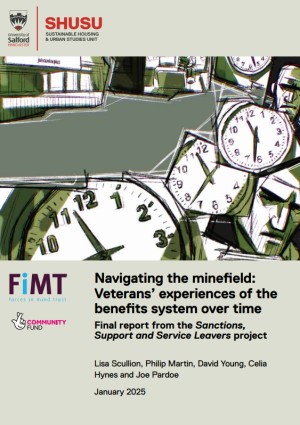 Funded by the Forces in Mind Trust, the University of Salford have taken forward a 3 year study on the experiences of ex-Service personnel and their families as they moved from legacy benefits to Universal Credit administered by DWP. This had been preceded by a programme of research and investigation into the experiences of veterans accessing the UK Social Security system. The ‘Sanctions, Support and Service Leavers’ project culminated in the publication of their final report in January 2025. The report praised progress in improving the UK benefits system for military veterans and reflected close engagement by the DWP with the research team.
Funded by the Forces in Mind Trust, the University of Salford have taken forward a 3 year study on the experiences of ex-Service personnel and their families as they moved from legacy benefits to Universal Credit administered by DWP. This had been preceded by a programme of research and investigation into the experiences of veterans accessing the UK Social Security system. The ‘Sanctions, Support and Service Leavers’ project culminated in the publication of their final report in January 2025. The report praised progress in improving the UK benefits system for military veterans and reflected close engagement by the DWP with the research team.
In the report the introduction of designated DWP Armed Forces Champions was reported positively by veterans. Their role is to help veterans with managing benefit claims, undergoing benefits assessments and accessing employment opportunities. Their ongoing support, check-ins and understanding of military life were all cited as factors behind positive experiences of the benefits system for ex-Service personnel. The experience of Armed Forces Champions was not consistent across different geographical areas though, and the uncertainty of future funding of these posts undermined their positive impact.
The report did, however, note that the complexity of the benefits system could often be exacerbated by lower financial literacy in ex-Service personnel, who have spent less time in civilian life. They were faced with challenges when using the benefits system such as delays in accessing medical records, a lack of clear guidance on the interaction between military compensation and civilian payments, and a feeling that they were not well-understood within the benefits system. It was suggested that clear guidance that is consistent across the DWP, MoD and Armed Forces charities would reduce misunderstandings and frustration with the interaction between civilian and military payments.
An independent review is currently underway in Scotland to consider people’s experiences of the first year of delivery of Adult Disability Payment, as well as the eligibility criteria. An interim report was published in November 2024 with the final report due this summer.
Overseen by the Scottish Government, the Scottish Welfare Fund is administered by each local authority in Scotland and provides two discretionary grants (crisis and community care). Some veterans and their families will meet the eligibility criteria for this funding.
The Ministry of Defence administers and delivers a complex range of pensions and compensation to Serving and ex-Service personnel. As a brief overview:
- War Pension Scheme (WPS) compensates for any injury, illness or death which was caused by Service before 6 April 2005. There are no time limits to making a claim. Claims to WPS can only be made after Service. There are 2 main types of WPS awards determined by the impact of the illness or injury sustained:
1. a gratuity is a tax free lump sum payment for disablement less than 20%
2. a pension is an ongoing tax free payment paid weekly or monthly for disablement more than 20%
Additionally, a War Widow(ers) Pension may be paid to a surviving spouse in the event of the death of a Service person or veteran. - Armed Forces Compensation Scheme (AFCS) compensates for injury, illness or death which was caused by Service on or after 6 April 2005. Claims to AFCS can be made in Service and post-Service, with time limits in place for making a claim. There are 2 main types of AFCS awards:
1. a tax-free lump sum for pain and suffering
2. a Guaranteed Income Payment which is also tax free, paid monthly
Additionally, a Survivor’s Guaranteed Income Payment may be paid to an eligible partner in the event of the death of a Service person or veteran. It is also worth noting that individuals may be able to claim from both WPS and AFCS in certain circumstances. - Armed Forces Pensions – a range of pensions payable to veterans. The type of pension depends on the period and length of Service. These pensions are generally taxable, although in some circumstances may be tax exempt. Spousal and dependents pensions are also available.
Understanding the complexities of the myriad pensions and compensation available to the military and veteran communities requires support from a range of professionals. In addition, there are considerations to be given to overlap with other benefits and the impact on the family income as a whole.
Some of the key challenges faced by veterans are set out below.
The Complexity of the Scottish Benefits System for Veterans Receiving Military Compensation:
The benefits system in Scotland is designed to provide financial support to those in need, but for veterans who also receive military compensation, navigating this system can be particularly challenging. The interaction between devolved benefits, UK-wide welfare provisions, benefits administered at the local authority level, and military compensation schemes creates a complex landscape that can lead to confusion, delays, and financial insecurity for veterans.
Interaction Between UK, Scottish, and Local Authority Benefits:
One of the key challenges is the interplay between devolved Scottish benefits, those administered at the UK level, and those delivered at the local authority level. The UK government oversees key benefits such as Universal Credit, the War Pension Scheme, and the Armed Forces Compensation Scheme, while the Scottish Government administers disability-related benefits, including Adult Disability Payment. Additionally, local authorities play a role in delivering benefits such as Housing Benefit and the Scottish Welfare Fund, adding another layer of complexity.
Veterans who receive military compensation may find that it affects their eligibility for certain means-tested benefits or leads to discrepancies in how their income is assessed across these different administrations. The complexity of veterans benefits overlapping with UK benefits arises from the interaction of military-specific entitlements and the broader civilian welfare provision. Furthermore, the lack of unified guidance and variable interpretations across local authorities and agencies can make it difficult for veterans to understand their full entitlements or navigate the appeals process when disputes arise.
Means Testing and Compensation Confusion:
 Military compensation, such as AFCS or War Pension payments, is intended to provide financial recognition for Service-related injuries. However, these payments can sometimes be considered in means-tested assessments for social security benefits, leading to unexpected reductions in entitlements. While some payments are disregarded in certain assessments, inconsistencies in how different benefits treat compensation contribute to confusion for veterans trying to plan their finances. For example, Universal Credit disregards all military compensation income, whereas the guidance for Pension Credit states that only the first £10 per week of such payments should be disregarded. This is clearly inconsistent.
Military compensation, such as AFCS or War Pension payments, is intended to provide financial recognition for Service-related injuries. However, these payments can sometimes be considered in means-tested assessments for social security benefits, leading to unexpected reductions in entitlements. While some payments are disregarded in certain assessments, inconsistencies in how different benefits treat compensation contribute to confusion for veterans trying to plan their finances. For example, Universal Credit disregards all military compensation income, whereas the guidance for Pension Credit states that only the first £10 per week of such payments should be disregarded. This is clearly inconsistent.
The “Credit Their Service” is a campaign by the Royal British Legion (RBL) and Poppyscotland, launched to address the unfair treatment of military compensation in means-tested welfare benefits across the UK. The campaign seeks to end the practice of counting military compensation as income when assessing eligibility for benefits. This policy often disqualifies some of the most financially vulnerable veterans from receiving crucial support such as Pension Credit and Housing Benefit and, in Scotland, Discretionary Housing Payments and the Scottish Welfare Fund. In contrast, civilian compensation (e.g. for personal injury) is typically exempt from such assessments. Poppyscotland’s work has revealed only 10 local authorities in Scotland have policies to exempt military compensation from means testing.
Lack of Clear Guidance and Support:
The lack of clear, veteran-specific guidance on how military compensation interacts with the Scottish benefits system further complicates matters. While various support organisations exist to assist veterans, the differing rules and risks of misinterpretations between UK, Scottish, and local authority benefits can make it difficult to get definitive answers. This uncertainty can lead to delays in accessing crucial financial support or veterans inadvertently missing out on benefits they are entitled to. In Scotland, the national guidance for local authority delivered benefits such as Discretionary Housing Payments and the Scottish Welfare Fund does not give any direction about disregarding AFCS and War Pension payments when assessing income.
Application and Appeals Processes:
The administrative burden of applying for benefits is another hurdle. Veterans must often provide extensive evidence of their injuries and financial situation, even when they are already receiving military compensation for Service-related conditions. Additionally, if a claim is denied or reduced due to compensation-related misunderstandings, veterans may need to go through lengthy appeals processes, further exacerbating financial strain.
Testimony to the Commissioner
Many of the veterans and support organisations I spoke to were concerned that the sheer number of pensions, benefits, payments and entitlements that contribute to the complexity of the landscape and systems tend not to be user or client friendly. There was a feeling that people may be missing out due to a lack of awareness of what they are entitled to, or because they give up due to the processes.
There are often lengthy delays in payments coming through, and, in some cases, there can be disputes over backdating claims. The volume of evidence required for a claim or application can be considerable.
It was felt that some support services, such as the Veterans Welfare Service, lack capacity to support veterans fully and more outreach would be beneficial.
Sanctions (such as when paying back loans or due to punitive measures) can impact on the ability of claimants to live off their benefits even when the amounts are small, and more flexibility would be welcomed.
DWP Armed Forces Champions advised that they provide support and advice to work coaches in jobcentres to enable them to deliver a bespoke service to veterans and their families. Regular training and upskilling sessions are provided across DWP in Scotland.
DWP note that around 40% of their Armed Forces Champions have Served or come from a military background resulting in a good mix of knowledge, understanding and skills. They are selected from internal recruitment exercises encouraging colleagues with a passion for supporting the armed forces community to apply. The Armed Forces Champions work closely with the third sector, making referrals where necessary for financial aid as well as to Citizens Advice Scotland to ensure that veterans receive appropriate support when applying for all benefits. This helps to mitigate the lack of awareness that many veterans have of welfare and other statutory services.
Armed Forces and Veterans Champions provide support to veteran families. One of the Service impacts on partners and adult children is their ability to gain and sustain employment. It is vital, therefore, that partners and children of veterans are identified as early as possible when they engage with DWP.
I heard from several veterans and support staff about the positive role that DWP Armed Forces and Veterans Champions play. Their accessibility (including attendance at drop-in sessions organised in local areas) and their ability to provide ‘veteran aware’ advice and guidance adds real value. I was told that they were often able to efficiently and swiftly resolve issues veterans were facing.
However, they were not always known about by veterans or organisations who support veterans, and it was suggested that their presence could be more actively promoted. It was also suggested that their coverage across Scotland was variable.
 Social Security Scotland was set up at pace and engagement with stakeholders continues to be a priority to ensure continuous improvement. I was told the organisation is keen to understand the experience and needs of the veteran community as part of that process.
Social Security Scotland was set up at pace and engagement with stakeholders continues to be a priority to ensure continuous improvement. I was told the organisation is keen to understand the experience and needs of the veteran community as part of that process.
Social Security Scotland does not currently have a programme or network of armed forces and veterans champions, unlike other parts of the public sector in Scotland (such as local authorities and NHS Boards). It does employ a number of veterans, and has recently been involved in a successful initiative to recruit members of the veteran community through a structured and supported route.
I heard about generally positive experiences interacting with Social Security Scotland, in particular around the person centred approach taken. It was noted that the Adult Disability Payment forms are lengthy, but that the numbers of decision reviews were low with applications generally settled at the first attempt. There has been a general consensus expressed to me that veterans who have claimed Adult Disability Payment have had a more positive experience when compared with claims made for the UK Government equivalent benefit, Personal Independence Payment.
Taking a trauma informed approach to supporting veterans was commended by many of those I spoke to, particularly given some of the issues they might have experienced during their Service.
It was good to hear that Social Security Scotland had been engaging with BLESMA and Sight Scotland Veterans throughout the policy development process for Adult Disability Payment and this engagement carries on to support continuous improvement.
I was told that the Scottish Child Payment, which helps low-income families with children under 16 and is one of the new benefits introduced in Scotland, can make a real difference for those families who are eligible.
What can be improved
As it continues to grow and mature as an organisation it will be important for Social Security Scotland to engage with veteran support organisations and members of the veteran community in the design, delivery and development of policy, practice and services. Broadening out this network of veteran organisations will help to ensure that the diversity of the veteran community is reflected in the voices it hears.
Social Security Scotland and Scottish Local Authorities should ask clients and service users if they have ever served in the armed forces so they can improve the richness of their data, gain a better understanding of the veteran community who access their services, and ensure that those services meet the particular needs of the veteran community.
Ensuring information gathered is correct and properly understood by staff (for example the difference between a pension and a compensation payment) will mean that calculations, payments, and disregards are as accurate as possible. This will avoid the need for payment re-calculations due to errors and will ensure that people are not missing out on what they are entitled to.
More needs to be done to ensure that there is clear and accurate communication between the various benefits delivery systems, and that front-line staff are fully trained in the management of these complex cases to ensure that veterans are not subjected to unnecessary misunderstanding or distress. It should also be noted that, with some benefits now devolved to Social Security Scotland, veterans in Scotland face another layer of complexity making it even more important to provide high quality advice.
As noted in ‘Community and Relationships: Anything but Uniform’, when public bodies in Scotland are calculating means tested benefits, it is essential that there is clarity and consistency across agencies and local authorities in the application of disregards.
The challenges of negotiating benefits systems apply to all claimants. However, the interactions between veterans benefits/pensions and the civilian welfare systems are uniquely complex. The veteran community requires expert advocacy to ensure that they receive the support they are due when making claims and that any resulting awards are correct, first time, every time.
Service in our armed forces, including injuries and illnesses arising from this Service, should not result in any disadvantage to veterans, as clearly stated in the Armed Forces Covenant. It follows, therefore, that clear, quality guidance and support is required to ensure that no such disadvantage exists. More must be done to provide easily accessible, effective support to veterans to address this inequity.
Spotlight on Complexity in the Welfare System
Veterans in Scotland can face particular challenges when applying for benefits. Whilst the UK and Scottish welfare systems are intricately connected, there is also divergence as the number of devolved benefits increases. The addition of veteran benefits to this already complex landscape can result in conflicting advice and costly misinterpretations of the rules and regulations governing the administration and award of benefits.
The examples below illustrate where complexity has made achieving good outcomes challenging. Based on evidence gathered through this work, these lived experiences show some of the unique challenges faced by the veteran community.
The rules regarding overlapping benefits present particular challenges for veterans. The interaction between MoD schemes and DWP benefits require specialist knowledge and understanding. In Scotland, this is further complicated when devolved benefits are awarded. This example highlights the positive contribution of DWP Armed Forces Champions in supporting veterans to negotiate these complexities.
This example illustrates the importance of ensuring that veterans are signposted to high quality, holistic support when they need it. Access to the correct information and advice at the beginning of the claimant journey would have prevented costly court action and avoided undue stress for the veteran.
In this example, the veteran had to make contact with 7 different organisations in order to access their income in full. More than one contact was required with 3 of these organisations before the matter was resolved and the veteran received their full entitlement.
Veterans frequently have to deal with multiple agencies and considerably more administration than other claimants. Navigating their way through these processes requires resilience, perseverance and patience. In contrast, the average Universal Credit claim takes 6 weeks, involving only one agency. Claimants can also apply for advance payments which can be made within 7 days.
In meeting our obligations to our Armed Forces community, the families of our veterans need to be treated with dignity and respect. With the spiralling costs of funerals, this example highlights the need for appropriate resourcing to ensure that distress is minimised to bereaved families. Veterans and their families deserve to receive timely awards of benefits and appropriate resources should be deployed to deliver this.
Explore report
- Report home
- Veterans and Finance Foreword
- Introduction and Approach
- Section 1 – Veterans and Finance: Financial Landscape
- Section 2 – Veterans and Finance: Benefits and the Welfare System
- Section 3 – Veterans and Finance: Gambling Harm
- Section 4 – Veterans and Finance: Sectoral Employment
- Scottish Veterans Commissioner Recommendations
